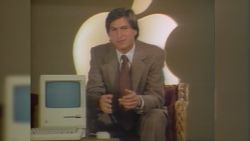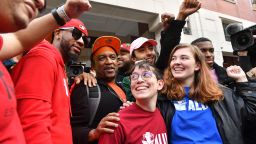Some employees at the Apple store at New York’s Grand Central Terminal are seeking to form a union, the latest high-profile labor organizing effort to take root in the pandemic era.
A person familiar with the matter told CNN Business that workers at the Grand Central Apple store have begun collecting signatures to file a petition to unionize, the first step of a union organizing effort. If they file cards from at least 30% of the workers at the store, the National Labor Relations Board can hold an election.
The employees leading the effort are partnering with Workers United, an affiliate of the Service Employees International Union, and the same union supporting the so-far-successful organizing effort at Starbucks.
The Apple employees have dubbed their effort Fruit Stand Workers United. The organizing effort was first reported by the Washington Post.
On the group’s website, it says a union is needed because wages have not kept pace with the cost of living in New York City. It said it also wants better job protections for workers.
“Apple has grown to be the most valuable company in the world,” the employees’ site says.”Why should its retail workers live precariously? We cannot live at the whims of Apple’s generosity. We can’t bet our futures on luck. If Apple’s goal is ‘To leave the world better than we found it,’ then they need to hold themselves to a higher standard.”
Apple (AAPL) would not comment directly on the organizing effort.
“We are fortunate to have incredible retail team members and we deeply value everything they bring to Apple,” said the company’s statement. “We are pleased to offer very strong compensation and benefits for full time and part time employees, including health care, tuition reimbursement, new parental leave, paid family leave, annual stock grants and many other benefits.”
The company has more than 270 US stores, and tens of thousands of US retail employees. The starting salary for retail workers is $20 an hour, or about $40,000 a year for a full-time employee. The average hourly wage for retailer workers at electronics and appliance stores nationwide stands at about $25.50 an hour, according to the Bureau of Labor Statistics. That is all workers in the sector, not the starting wage.
Growing union efforts
The employees leading the organizing effort at the Grand Central store, and the Workers United union, argue that a union is needed no matter the current starting wage.
“Hourly wage workers across the country have come to the realization that without organizing for a collective voice, employers will continue to ignore their concerns in the workplace,” said a statement from Workers United. “Workers across the country have decided a collective voice is what they need, and organizing movements are stronger than they have been in a long time.”
While nearly 40% of government workers belong to unions, only 6.1% of private sector employees are union members, according to data from the Bureau of Labor Statistics. And the representation of retail workers is even lower — only 4.4%, with most of those in grocery stores. Union membership has been in a decline for decades, with private sector union membership falling from steadily from the 16.8% it held in 1983. Organizing nonunion companies such as Starbucks, Amazon and Apple are crucial to union efforts to regain influence they have lost over the decades.
Typically a union waits until it has cards from more than 50% of workers to file for an election, and even then the efforts to win an election often fail in the face of an anti-union campaign by management to persuade employees to vote no.
The trend appears to be shifting. Earlier this month, Amazon employees at a warehouse in Staten Island made history when they voted in favor of a union. And at more than a dozen Starbucks stores nationwide, unions have secured high-profile victories, inspiring other workers to follow suit.
In the past six months, the number of elections filed with the NLRB is up 57% from the same period a year ago. It’s the most active level of organizing in at least 10 years.
Unhappy Apple workers
The effort is just the latest example of worker agitation inside Apple’s corporate and retail workforce that seeped outside the company and into the public sphere.
The company, which has long prided itself on secrecy, has seen its employees push back and speak out over issues ranging from alleged pay disparities, remote work policies and mistreatment of its frontline retail workers.
In August, two Apple employees, Janneke Parrish and Cher Scarlett, started #AppleToo to help workers “organize and protect ourselves,” as they pushed workers across Apple’s various workforces, including corporate and retail, to share stories to demand changes.
Parrish was fired by Apple, and she’s filed a charge with the National Labor Relations Board alleging retaliation. Meanwhile, Scarlett left Apple in November; she also has pending complaints with the Labor Board.
Apple in November posted a statement to employees informing them of their right to speak up about pay and workplace conditions. A spokesperson declined to comment on those cases.
Earlier this year, one former Apple retail worker published a lengthy Medium post titled “Apple’s Retail Staff are Second-Class Employees: A Memoir from the Fruit Stand” after turning in his resignation notice, detailing his time working for the company since 2016.
“Apple easily has the financial resources to be the exemplar of a modern, progressive workplace, but instead has established itself as the paradigm of capitalist greed,” wrote Matt Herbst, telling CNN Business in February that he’d already had roughly 100 people reach out to him that work at various stores telling him they’d had similar experiences.

























